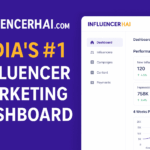Influencer marketing is a powerful marketing strategy for all businesses to reach their target audiences and drive sales. At its core, influencer marketing involves partnering with individuals, i.e., influencers with a large following and influence over a specific niche or industry on social media platforms.
These influencers, also known as brand ambassadors or advocates, use their platforms to promote products or services to their followers, who trust their opinions and recommendations.
The main reason influencer marketing is so effective is that it leverages the power of social proof. People tend to trust the recommendations of their peers and those they follow on social media more than traditional advertising. By partnering with an influencer who has built a loyal following, businesses can tap into that trust and credibility to reach a highly engaged audience.
Influencer marketing can help businesses reach niche audiences that may be difficult to reach through traditional advertising channels. Influencers often have a particular niche or interest, such as beauty, fashion, or travel, and their followers are likely to share those interests.
This makes it easier for businesses to target the right audience and increase the chances of reaching people more likely to be interested in their products or services.
Influencer marketing also allows businesses to create authenticity, which helps them to resonate with their target audience. Influencers are experts in creating content that their followers love, and by partnering with them, businesses can tap into that expertise and create content that is more likely to be shared and engaged with.
Lastly, influencer marketing can be more cost-effective than traditional advertising methods. It often requires lower investment and can drive higher returns, especially when compared to conventional forms of advertising such as television, radio, or print ads.
Overall, influencer marketing is a powerful tool that allows businesses to reach highly engaged audiences, create authentic and engaging content, and drive sales. By leveraging social proof and influencers’ expertise, businesses can effectively reach their target audiences and achieve their marketing goals.
According to a 2020 survey by Influencer Marketing Hub, 92% of marketers who used influencer marketing in their campaigns found it compelling. Additionally, the same study found that the average return on investment (ROI) for influencer marketing was $5.20 for every $1 spent, making it one of the most cost-effective forms of marketing.
Another study by Business Insider found that influencer marketing is set to become a $10 billion industry by 2020. Furthermore, the study also found that 40% of consumers have purchased after seeing it recommended by an influencer on social media.
A survey by Mediakix found that micro-influencers, or influencers with less than 100,000 followers, have higher engagement rates with their followers than influencers with larger followings. This suggests that businesses should consider partnering with micro-influencers and more established influencers.
In 2021, the most popular platforms for influencer marketing were Instagram and TikTok, followed by YouTube and Twitter. However, platforms like TikTok and Instagram Reels are gaining popularity as the younger generation is more active on these platforms.
Overall, the statistics and trends of influencer marketing show that it is a highly effective and cost-efficient form of marketing that businesses should consider incorporating into their campaigns.
These statistics and trends are based on the information available until 2021, and the current scenario may have changed. It would be best to look for recent and relevant statistics from credible sources to get updated information on the subject.
Influencer marketing has come a long way since its inception, and the future of this industry looks promising. With the continued growth of social media and the increasing popularity of influencer marketing, businesses and brands are turning to influencers to reach their target audiences and drive sales.
One of the biggest trends in influencer marketing is the rise of micro-influencers. These individuals with a smaller following, typically between 1,000 and 100,000 followers, have a more niche focus and a highly engaged audience. Micro-influencers are becoming more popular because they offer a more authentic and relatable connection to their followers, and they often have higher engagement rates than influencers with larger followings.
AI and automation will change the future of influencer marketing. These technologies will allow brands to analyze large amounts of data to identify the most effective influencers for their campaigns and automate reaching out to and working with influencers.
The future of influencer marketing also includes the rise of nano-influencers. These individuals have a smaller following than micro-influencers. They typically have under 10,000 followers and are considered used voices within their small communities.
These influencers greatly impact the purchasing decisions of their followers, and brands are increasingly turning to them to reach out to niche audiences.
In addition, Video content will continue to gain popularity. Platforms like TikTok and Instagram Reels are becoming more popular and are providing new opportunities for influencers and brands to create visually engaging content that resonates with their audiences.
Regulation will increase in the future of influencer marketing, with governments and industry organizations working to establish guidelines and best practices. Govt. bodies implementing measures to promote ethical and transparent practices within influencer marketing
Overall, the future of influencer marketing looks bright, with emerging new trends and technologies that will allow brands to reach their target audiences more effectively and efficiently. Businesses and brands that can adapt to these trends and use them to their advantage will be well-positioned to succeed in influencer marketing.
